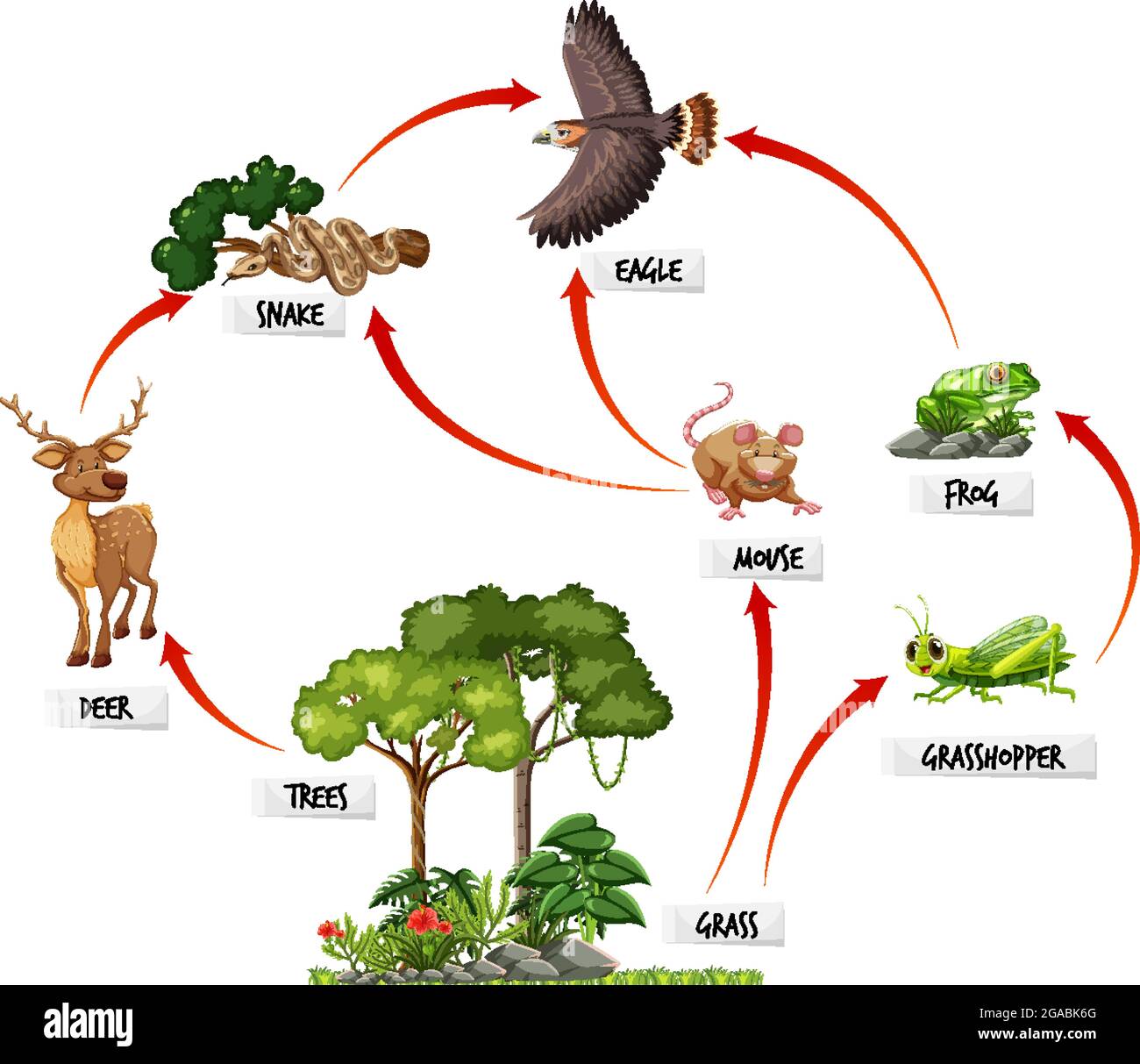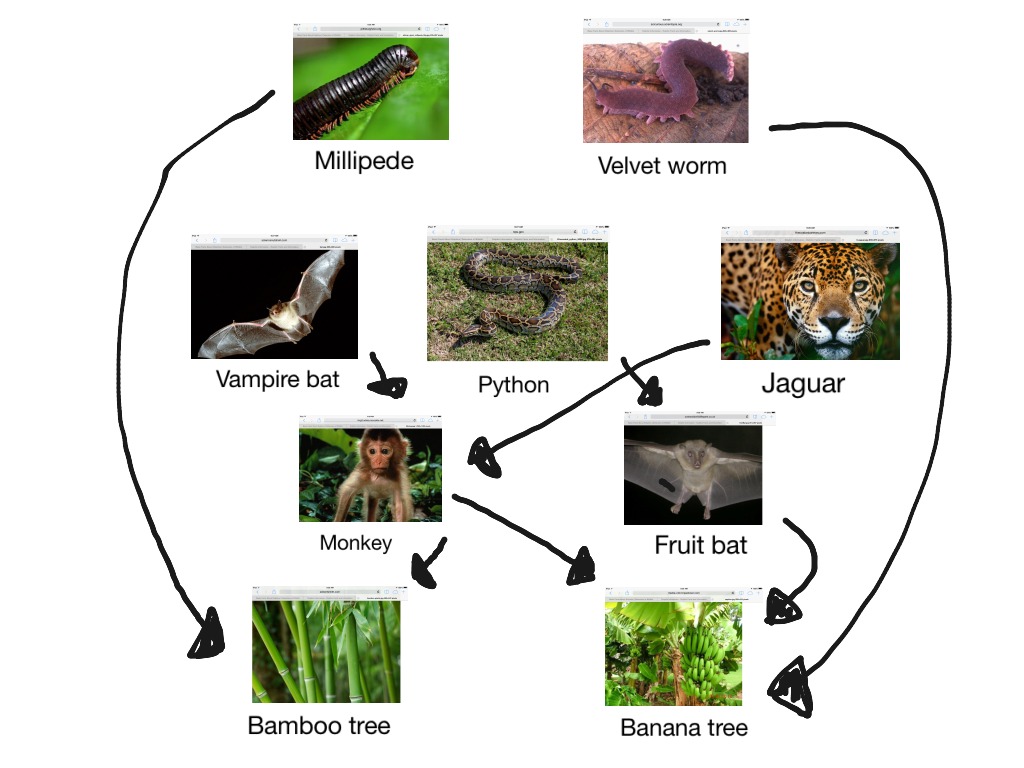Delve into the center of tropical forests and discover the intricate internet of existence that sustains its colourful ecosystem. From towering timber to the tiniest bugs, each organism performs an important position in keeping up the subtle steadiness of the tropical wooded area meals internet.
Manufacturers, reminiscent of crops, harness the solar’s power to create the basis of this complicated community. Number one shoppers, like herbivores, ceremonial dinner on those crops, whilst secondary shoppers, reminiscent of carnivores, hunt them. On the apex of the meals chain, tertiary shoppers reign perfect as peak predators.
Advent to Tropical Wooded area Meals Webs

Within the colourful tapestry of tropical forests, meals webs play a pivotal position in keeping up ecological steadiness and maintaining existence. A meals internet is a fancy community of interconnected meals chains, the place organisms at other trophic ranges eat and are fed on by way of others.
Tropical forests boast an astonishing variety of organisms, from microscopic micro organism to towering timber. This organic richness interprets right into a extremely intricate meals internet with quite a lot of trophic relationships.
Various Organisms in Tropical Wooded area Meals Webs
Number one manufacturers, reminiscent of crops and algae, shape the basis of the meals internet, changing daylight into power thru photosynthesis. Herbivores, together with bugs, birds, and mammals, feed on crops, whilst carnivores prey on herbivores. Decomposers, reminiscent of fungi and micro organism, spoil down useless organisms and recycle vitamins again into the ecosystem.
- Manufacturers:Crops, algae, cyanobacteria
- Herbivores:Bugs, birds, mammals, reptiles, amphibians
- Carnivores:Predators, scavengers, parasites
- Decomposers:Fungi, micro organism, protozoa
The intricate interaction between those various organisms guarantees the steadiness and resilience of tropical wooded area ecosystems.
Manufacturers and Number one Shoppers

Tropical forests are famend for his or her astounding biodiversity, and this variety is mirrored within the intricate internet of interactions between the organisms that inhabit those ecosystems. Manufacturers, basically crops, shape the basis of the meals internet, offering sustenance to a limiteless array of number one shoppers, or herbivores.
Varieties of Manufacturers in Tropical Forests
The plush crops of tropical forests is ruled by way of a various array of plant species, every tailored to the original environmental stipulations of its area of interest. Some of the maximum not unusual kinds of manufacturers in tropical forests are:
- Timber:Towering timber shape the cover layer, intercepting daylight and offering habitat for a large number of organisms. Their leaves are regularly vast and skinny, maximizing gentle absorption.
- Shrubs:Shrubs occupy the understory layer, thriving within the dappled gentle that filters during the cover. They regularly have thick, leathery leaves to resist the tough stipulations.
- Vines:Vines climb up timber and different helps, attaining against the daylight. Their stems are versatile and woody, permitting them to succeed in nice heights.
- Epiphytes:Epiphytes are crops that develop at the surfaces of different crops, acquiring vitamins from the air and water. They come with orchids, bromeliads, and ferns.
Diversifications of Number one Shoppers
Number one shoppers in tropical forests have developed quite a lot of variations to milk the plant-based assets to be had to them. Those variations come with:
- Specialised Diets:Herbivores have developed specialised digestive programs that permit them to wreck down and make the most of plant subject material. Some species, reminiscent of leaf-eating monkeys, have specialised tooth for grinding leaves, whilst others, reminiscent of fruit-eating birds, have beaks tailored for cracking open end result.
- Camouflage and Mimicry:Many herbivores depend on camouflage and mimicry to steer clear of predators. As an example, stick bugs resemble twigs, whilst leaf bugs mimic leaves.
- Social Conduct:Some herbivores shape herds or flocks for defense in opposition to predators. By way of aggregating in combination, they may be able to confuse predators and make it tougher for them to unmarried out a person.
Secondary and Tertiary Shoppers
Secondary shoppers, repeatedly referred to as carnivores, play a a very powerful position within the tropical wooded area meals internet by way of eating number one shoppers, reminiscent of herbivores and bugs. They lend a hand keep watch over the populations of those number one shoppers, combating overpopulation and making sure the steadiness of the ecosystem.
Secondary shoppers come with a various vary of animals, from small reptiles and amphibians to very large predators like jaguars and eagles.
Tertiary Shoppers, Tropical wooded area meals internet
Tertiary shoppers, often referred to as peak predators, are the apex predators within the meals internet. They feed totally on secondary shoppers and play a essential position in keeping up the steadiness of the ecosystem. Tertiary shoppers have developed exceptional variations for searching and taking pictures prey, together with sharp tooth, willing eyesight, and stealthy habits.
Examples of tertiary shoppers in tropical forests come with massive cats, reminiscent of jaguars and tigers, in addition to raptors, reminiscent of eagles and hawks.
Decomposers and Nutrient Biking: Tropical Wooded area Meals Internet
Decomposers are the unsung heroes of the tropical wooded area meals internet. Those organisms, which come with fungi, micro organism, and invertebrates, play a a very powerful position in breaking down useless plant and animal subject, returning vitamins to the soil and making them to be had to different organisms.
Nutrient biking is the method through which vitamins are transferred from one organism to some other inside of an ecosystem. In tropical forests, decomposers are accountable for almost all of nutrient biking. They spoil down natural subject into inorganic vitamins, reminiscent of nitrogen, phosphorus, and potassium, which is able to then be absorbed by way of crops.
Significance of Decomposers
- Decomposers lend a hand to recycle vitamins again into the soil, making them to be had to different organisms.
- They lend a hand to wreck down useless plant and animal subject, which is able to lend a hand to forestall the buildup of natural waste.
- Decomposers play a job within the decomposition of natural subject, which is able to lend a hand to scale back the volume of greenhouse gases launched into the ambience.
Meals Internet Interactions
Inside the intricate tapestry of tropical wooded area meals webs, a dynamic array of interactions unfolds, shaping the subtle steadiness of this ecosystem. Those interactions surround a spectrum of relationships, together with predation, festival, and mutualism, every enjoying a a very powerful position in keeping up the internet’s steadiness and resilience.
Predation
Predation, a basic drive in tropical wooded area meals webs, comes to one organism eating some other for sustenance. Predators actively hunt and seize their prey, exerting a top-down keep watch over on prey populations. This courting performs an important position in regulating inhabitants sizes and combating overpopulation of sure species.
As an example, jaguars, apex predators within the Amazon rainforest, prey on herbivores reminiscent of deer and peccaries, holding their numbers in test and making sure a wholesome steadiness inside the ecosystem.
Pageant
Pageant, some other vital interplay, arises when organisms vie for restricted assets reminiscent of meals, water, or territory. This festival can happen between folks of the similar species (intraspecific festival) or between other species (interspecific festival). Pageant drives organisms to conform and evolve methods to outcompete opponents, shaping the distribution and abundance of species inside the wooded area.
Mutualism
Mutualism, a cooperative courting, comes to two species making the most of their affiliation. In tropical forests, mutualistic interactions are considerable and play an important position in ecosystem functioning. As an example, sure species of ants shape symbiotic relationships with acacia timber, protective them from herbivores in alternate for the sugary nectar produced by way of the timber.
Those mutualistic relationships beef up the survival and reproductive good fortune of each species.
Affects on Tropical Wooded area Meals Webs

Human actions can considerably disrupt tropical wooded area meals webs, resulting in cascading results on biodiversity and ecosystem functioning. Those affects come with habitat loss, fragmentation, and local weather trade.
Habitat Loss and Fragmentation
Habitat loss and fragmentation happen when forests are cleared or transformed for different land makes use of, reminiscent of agriculture, logging, or urbanization. This reduces the volume and high quality of habitat to be had to species, making it tougher for them to search out meals, safe haven, and buddies.
Fragmentation additionally isolates populations, decreasing gene float and lengthening the danger of native extinctions.
- Lack of keystone species:Habitat loss can result in the lack of keystone species, which play a disproportionately massive position in keeping up ecosystem steadiness. As an example, the lack of fig timber, that are vital meals assets for plenty of animals, may have cascading results on different species that depend on them.
- Diminished species variety:Habitat loss and fragmentation can cut back species variety, as some species are extra delicate to those adjustments than others. This may disrupt meals webs, as other species play other roles within the ecosystem.
- Larger edge results:Fragmentation creates extra edges between other habitats, which may end up in larger edge results. Edge results can adjust microclimates, build up predation possibility, and facilitate the unfold of invasive species.
Local weather Exchange
Local weather trade may be a significant risk to tropical wooded area meals webs. Emerging temperatures and adjustments in precipitation patterns can adjust the distribution and abundance of species, disrupt meals chains, and build up the danger of illness outbreaks.
- Shifts in species levels:Local weather trade may cause species to shift their levels to extra appropriate habitats. This may disrupt meals webs, as species which might be tailored to other climates won’t have the ability to continue to exist within the new stipulations.
- Altered meals availability:Local weather trade can adjust the provision of meals for various species. As an example, adjustments in temperature and precipitation can have an effect on the expansion and distribution of crops, which is able to in flip have an effect on the provision of meals for herbivores and carnivores.
- Larger illness outbreaks:Local weather trade can build up the danger of illness outbreaks, as hotter temperatures and changed precipitation patterns can create extra favorable stipulations for the unfold of pathogens.
Conservation and Control
Conserving tropical wooded area meals webs is necessary for the planet’s biodiversity and the very important products and services they supply. Those forests harbor an intricate tapestry of species, every enjoying a a very powerful position in keeping up ecosystem steadiness. Their conservation and sustainable control are very important to safeguard those irreplaceable herbal belongings.
Methods for managing and protective tropical forests come with:
Established order of Safe Spaces
- Designating spaces as nationwide parks, flora and fauna sanctuaries, or biosphere reserves to safeguard wooded area ecosystems and the species they beef up.
- Implementing rules to forestall deforestation, searching, and different actions that threaten meals internet integrity.
Sustainable Wooded area Control
- Enforcing selective logging practices that reduce harm to the wooded area and its population.
- Selling agroforestry and different sustainable land-use practices that combine wooded area conservation with agricultural manufacturing.
Neighborhood Involvement
- Enticing native communities in conservation efforts to foster stewardship and cut back dependence on unsustainable practices.
- Offering financial incentives for communities to give protection to forests and their meals webs.
FAQs
What’s the importance of decomposers within the tropical wooded area meals internet?
Decomposers play a a very powerful position in nutrient biking, breaking down useless organisms and returning vitamins to the soil, making them to be had for crops to take in.
How does festival have an effect on interactions inside the tropical wooded area meals internet?
Pageant drives species to conform and specialise in other niches, decreasing overlap and selling the coexistence of more than one species inside of the similar ecosystem.

